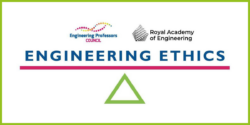 Welcome to the advice and guidance pages of EPC’s Engineering Ethics toolkit, produced in partnership with the Royal Academy of Engineering. Click here for the toolkit homepage.
Welcome to the advice and guidance pages of EPC’s Engineering Ethics toolkit, produced in partnership with the Royal Academy of Engineering. Click here for the toolkit homepage.
These guidance articles are intended to provide a library of expertise in engineering ethics and how best to embed learning into teaching practice. They aim to help situate our case studies in an educational context and to signpost to additional research and resources on engineering ethics.
Introduction to engineering ethics:
- What is ethics?
- Why integrate ethics in engineering?
- Guidance for ethical decision-making rooted in research and practice
Integrating ethics:
- How to integrate ethics into a module or course
- Pedagogical approaches to integrating ethics in engineering
- Using a constructive alignment tool to plan ethics teaching
Debate & discussion:
- Tackling tough topics in discussion
- Integrating a technical feasibility debate – a new approach to engaging students in ethics in engineering
Using case studies:
- How to organise class sessions using Ethics case studies
- Best practice in teaching engineering ethics through case studies
- A recipe for creating a case study in engineering ethics
- Existing case study libraries
Assessing ethics:
- Methods for assessing and evaluating ethics learning in engineering education
- Assessing ethics: Guidance & rubric
- Assessing ethics: Case study example: Water wars
Topics:
- Embedding equity, diversity and inclusion into a professional engineer’s lifestyle
- Universal and inclusive co-design of the built environment and the transportation systems
- Why information literacy is an ethical issue in engineering
To ensure that everyone can use and adapt these articles in a way that best fits their teaching or purpose, this work is licensed under a Creative Commons Attribution-ShareAlike 4.0 International License. Under this license you are free to share and adapt this material, under terms that you must give appropriate credit and attribution to the original material and indicate if any changes are made.
Get involved: These guidance articles were created as part of the EPC’s Engineering Ethics Toolkit that is intended to evolve and grow over time. Further content will be added or linked to in due course. We are actively inviting experts to submit resources for review and possible inclusion in this toolkit. For more information, see our Get involved page.
 Welcome to the advice and guidance pages of EPC’s Engineering Ethics toolkit, produced in partnership with the Royal Academy of Engineering. Click
Welcome to the advice and guidance pages of EPC’s Engineering Ethics toolkit, produced in partnership with the Royal Academy of Engineering. Click